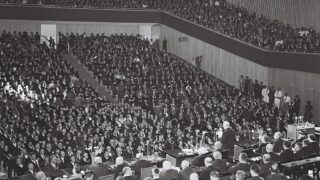It is nearly impossible to think about Palestinians in Israel outside the framework of Israeli citizenship. Often, ’48 Palestinians are referred to as Palestinian citizens of Israel, Israeli Arabs or Israeli Palestinians. These phrases do not merely describe the legal status of ’48 Palestinians. They rather connote an identity to which Israeli citizenship is inherent.
Since the establishment of the state of Israel in 1948, the political discourse and mobilization of Palestinians in Israel has been framed around citizenship. ’48 Palestinians have been struggling to develop a more substantive, meaningful, and inclusionary vision of citizenship, to transform themselves from second-class to equal citizens. For example, Al-Jabha, known as the Democratic Front for Peace and Equality, advanced liberal claims for civil equality while al-Tajammu’, known as the National Democratic Assembly, advocated a multicultural citizenship based on the recognition of ’48 Palestinians as a national minority.
The political discourse of Palestinians in Israel is focused on the reforming of Israeli citizenship. Even the recent Nation-State Law, which determines that the right to self-determination is an exclusive right of the Jewish people, and Trump’s “deal of the century”, which includes a proposal to transfer ten Palestinian villages in the Triangle area to the Palestinian state and to strip 250,000 Palestinians of their Israeli citizenship, did not undermine the centrality of citizenship as the key to political membership and to the fulfillment of political, civil, and social rights. And yet, it continues to fail us.
This failure calls for a radical rethinking of the illusionary promise of Israeli citizenship as a vehicle for political transformation. It is time to question citizenship as an institution. Israeli citizenship did not emerge as an autonomous or neutral institution, or as an institution antagonistic to Zionist settler colonialism. Rather, it emerged out of colonial domination. After all, Israeli citizenship is a product of the Zionist colonial conquest of Palestine. The inferiority of ’48 Palestinians has been ingrained in and inherent to Israel’s citizenship regime from its outset. Even though Israel has awarded suffrage rights and later citizenship to (some) of the Palestinians who remained in territories it controlled after its establishment, the Israeli state never considered Palestinians as indigenous to the space or as natural subjects of rights.
Palestine: from shared life to co resistance
04-07-2018
To understand the vulnerability of Palestinian citizenship in Israel today, we need to turn to the history of citizenship making in Israel. In what follows, I return to the period between 1948 and 1952. During this period, the 1950 Law of Return, which governs Jewish entitlement to citizenship, and the 1952 Citizenship Law, which governs the status of ’48 Palestinians, were enacted. This formative period, in which the constitutional cornerstones of Israel’s citizenship regime came into being, shows that Israeli citizenship has been constituted as an institution of domination and functioned as a mechanism of ethnic cleansing by keeping the vast majority of Palestinians outside its scope, and thus in refuge and exile. It also served instrument of race making, creating a hierarchy between Jews and Palestinians along racial lines. While Jewish settlers were viewed as authentic subjects of citizenship who were therefore entitled to automatic semi-birthright citizenship, Palestinian citizenship was constructed as a benevolent act of gesture by the state. This holds true also today. The history of citizenship making in Israel shows that Israeli citizenship is part of the problem, not the solution.
Arab Suffrage as Jewish Sovereignty
Israel’s inaugural elections, which took place in January 1949, constituted the first significant moment at which Israel had to deal with the status of the Palestinians who remained in the territories it controls. Suffrage was the main question with which it grappled. Israeli leaders decided to extend voting rights to the Palestinians under their rule. According to Shira Robinson this decision was guided by international constraints. When Israel’s first bid for membership in the UN failed in 1948, Israel submitted a second. Fears of another failure prompted Israeli leaders to enfranchise (some of) the Palestinians.
“There needs to be a naturalization law, but not for the Jews. A Jew who comes to settle in the country is automatically a citizen; he is guaranteed the right to be a citizen in advance. I differentiate here not in the laws, but in the rights towards this country. The others are granted the right to be here only by an act of benevolence, but not the Jew. He is entitled. That is by basic assumption” (Ben Gurion statement).
Other geopolitical considerations of territory and sovereignty also played a role in Israel’s decision to extend voting rights to Palestinians. While most ministers supported enfranchisement, Bechor-Shalom Shitrit, the Minister of Minorities’ Affairs, argued that Arab suffrage contravened Jewish interest, since borders were yet to be defined. Mobilizing international law to make his claim, Shitrit asked: “Would anyone dare to consider that England would include residents of her administered territories in her parliament?” To that, the Justice Minister Felix Rosenblueth (later known as Pinchas Rosen) replied: “We have done something that perhaps contravenes international law: we applied the state laws on the administered territories. Therefore, we have an obligation to hold the elections also in these territories.”
Rosenblueth and the other ministers understood what Shitrit had missed: that the question of suffrage was intimately tied to the question of territory and sovereignty. By applying Israeli law in the territories that the international community had not yet acknowledged as part of the Jewish state (especially in parts of the Galilee), and by holding elections and giving Palestinians in those territories voting rights, Israel kept the question of territory and borders open. In effect, the state advanced international recognition of its sovereignty in these territories by creating facts on the ground. The participation of Palestinians in the elections further foregrounded the legitimacy of a de facto annexation. Arab suffrage was, thus, instrumental to the making of Jewish sovereignty.
Citizenship: An Instrument of Ethnic Cleansing
Israel’s leaders were deeply divided over the question of whether Israel needs to create its own national citizenship. The same aspiration drove both the opponents and the proponents of a citizenship law: to limit the number of Palestinians in Israel and to solidify the ethnic cleansing of Palestinians. Proponents of the law were not driven by inclusionary sensibilities. They argued that leaving the citizenship question unresolved would jeopardize Jewish demographic superiority. A citizenship law, they asserted, would cement who was legal and who was illegal, and thus who is deportable.
Ben Gurion, however, fiercely opposed the legislation of a citizenship law. The following exchange between him and then Transportation Minister David Remez illustrates his position:
Ben Gurion: When you have a country in a stable condition, then the question of citizenship is a simple one. But here you are asking to make decisions about matters that we are not interested in finalizing.
David Remez: Following your logic, let’s assume that the questions of borders and Arab refugees have been settled, but thirty years afterward we occupy an additional territory. What should we do then?
Ben Gurion: In that case, the citizenship law will wait for another thirty years. We are in an unstable and changing situation, so why should we get ourselves into trouble by resolving this matter? I don’t understand the urgency.
Recognising Indigeneity, Erasing Palestine
18-05-2019
As long as Israel was expanding territorially and as long as the question of borders remained open, Ben Gurion sought flexibility. Citizenship, he recognized, could provide protections that would make scenarios of future expulsion more complicated, if not almost impossible. For Ben Gurion, territorial consolidation trumped considerations of demography. Once territory was secured, the status of Palestinians was a question that would remain open—for decades if necessary. This line of reasoning guided his decision making. For example, in May 1949, the cabinet discussed the hypothetical question of absorbing the Gaza Strip, which at the time had one hundred fifty to one hundred seventy thousand Palestinian inhabitants, if an international agreement offered it to Israel. Ben Gurion had no hesitation: the answer was an unequivocal “yes.”
The naturalization of Palestinians proceeded slowly. The Israeli state only naturalized 218 Palestinians between July 1952 and January 1959. Thousands of cases reached the courts. The citizenship status of some was settled in the late 1960s, following Israel’s decision to join the Convention on the Reduction of Statelessness. Others had to wait for the 1980 amendment.
While some cabinet members feared an increase in the number of Palestinians, Ben Gurion saw the big picture. He knew that as long as formal citizenship did not exist, residence did not necessarily translate into suffrage or citizenship, and suffrage did not necessarily mean citizenship. Creating a vulnerable status for the Palestinians under Israeli rule was his guiding principle. He wanted their status to remain a matter of administrative—and preferably military—discretion.
The status that Ben Gurion envisaged was a combination of the current status of the Palestinians in the West Bank and the Gaza Strip and the residence status of Palestinians in East Jerusalem, residence that is easily revokable by administrative ministerial discretion.
Despite Ben Gurion’s objection, the government decided to bring the bill to a vote. It passed by the thin margin of six to five.
Citizenship as Gesture
After the government’s vote, the Ministry of Justice was tasked with drafting a universal citizenship law that would apply to both Palestinians and Jews. This, however, proved difficult. The cabinet rejected all the ministry’s drafts. It considered the idea of putting Jewish citizenship on par with that of Palestinians outrageous. As stated by Ben Gurion:
There needs to be a naturalization law, but not for the Jews. A Jew who comes to settle in the country is automatically a citizen; he is guaranteed the right to be a citizen in advance. I differentiate here not in the laws, but in the rights towards this country. The others are granted the right to be here only by an act of benevolence, but not the Jew. He is entitled. That is by basic assumption.
Trump’s “deal of the century”, which includes a proposal to transfer ten Palestinian villages in the Triangle area to the Palestinian state and to strip 250,000 Palestinians of their Israeli citizenship, did not undermine the centrality of citizenship as the key to political membership and to the fulfillment of political, civil, and social rights.
The United Religious Front’s Zerach Warhaftig, a lawyer who later served as a Knesset member and as a cabinet minister suggested the legislation of two laws instead of one. The first, the Law of Return, which was enacted in 1950, provides every Jew the right to immigrate to Israel (‘aliya) and to be granted automatic citizenship rights. Under this law, Jews were considered as natural and authentic subjects of citizenship. The Jewish people, Ben Gurion argued have an “a priori right . . . to settle in this land.” The second, the Citizenship Law of 1952, was designed to govern the citizenship of Palestinians whose citizenship was considered the result of the state’s benevolence, not a natural right. Together, the two laws transformed Jewish settlers into native and Palestinians natives into strangers.
Who stole the Land?
08-05-2015
Warhaftig’s solution allowed Israeli leaders to discriminate against Palestinians while still appearing liberals. As Ben Gurion commented: “I suggest that the citizenship law will apply in practice only to non-Jews, without needing to mention that . . . it will apply to everyone except for Jews.” Unlike Jews, Palestinian entitlement to citizenship was not unconditional. The citizenship of ’48 Palestinians was regulated in section 3 of the Citizenship Law (citizenship by residence). This section of the law automatically excluded all Palestinian refugees and it applied legal constraints that restricted ’48 Palestinians from qualifying for citizenship status. As a result, only 63,000 of the estimated one 160,000 Palestinians living in Israel in 1952 received citizenship with the law’s enactment. The law was so restrictive that entitlement to suffrage during the first and second parliamentary elections did not guarantee the extension of citizenship if a person failed to meet the set conditions. Consequently, many Palestinians found themselves denied citizenship despite having enjoyed voting rights in the past.
Those denied citizenship by residence had to apply for citizenship under section 5 of the law, citizenship by naturalization, which was designed to govern the naturalization of foreign (non-Jewish) immigrants. Palestinians who found themselves outside the scope of section 3 were now just like foreign immigrants. They, the natives, had to prove lawful residence in the country and to demonstrate “some knowledge of the Hebrew language”; demands that Jewish settler immigrants were not required to meet.
It is time to question citizenship as an institution and to get a radical rethinking of the illusionary promise of Israeli citizenship as a vehicle for political transformation. Citizenship is deceptive institution; it enacts domination and conceals it at the same time. It is time to expand our political imaginary and think beyond citizenship. Our freedom depends on our ability to transcend citizenship and its destructive logics.
The naturalization of Palestinians proceeded slowly. The Israeli state only naturalized 218 Palestinians between July 1952 and January 1959. Thousands of cases reached the courts. The citizenship status of some was settled in the late 1960s, following Israel’s decision to join the Convention on the Reduction of Statelessness. Others had to wait for the 1980 amendment to the Citizenship Law, which extended citizenship to Palestinians who had been registered as citizens by July 1952 or who had entered legally afterward. Even today, hundreds of Bedouin in the Naqab remain stateless and their citizenship status is yet to be resolved, while the state is trying to advance plans to de-naturalize Palestinian citizens. Moreover, despite their formal status as citizens, the Israeli state still regards Palestinians in Israel as temporary guests and movable people.
The False Promise of Citizenship
Palestinians in Israel have been mobilizing their citizenship to gain recognition of their rights for over seven decades, with limited success. Citizenship has been an important means of sumud for ’48 Palestinians in Israel. However, while citizenship, for the most part, allowed ’48 Palestinians stay in their homeland, it also constrained their struggle. This is not a call for ’48 Palestinians to give up their citizenship. We would be advancing our own expulsion. But there is a difference between holding on to citizenship as a matter of survival and between staking our freedom and dignity on it.
Citizenship is deceptive institution; it enacts domination and conceals it at the same time. It promises inclusion, but this promise is an illusion. Even within its most progressive liberal formation, citizenship is still part of settler colonialism, not exterior to it. There is no possibility for an equal citizenship within the framework of the settler state. It is time to expand our political imaginary and think beyond citizenship. Our freedom depends on our ability to transcend citizenship and its destructive logics.
*This article is based on a recently published paper in the Arab Studies Journal.





